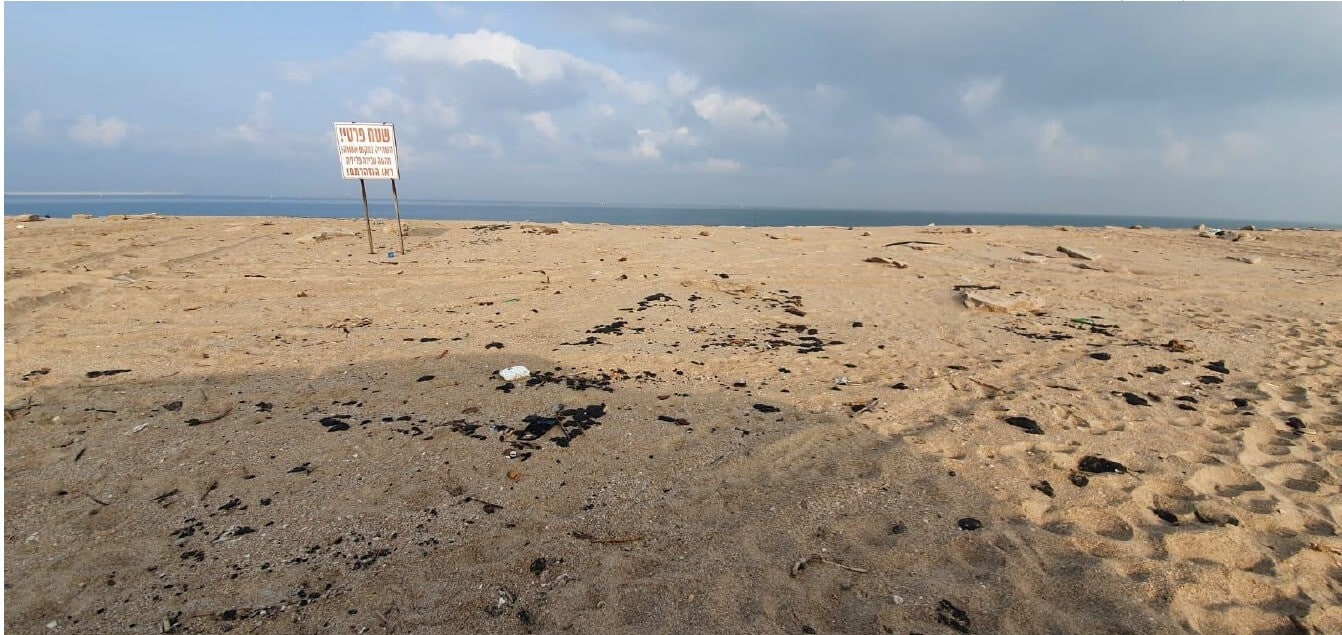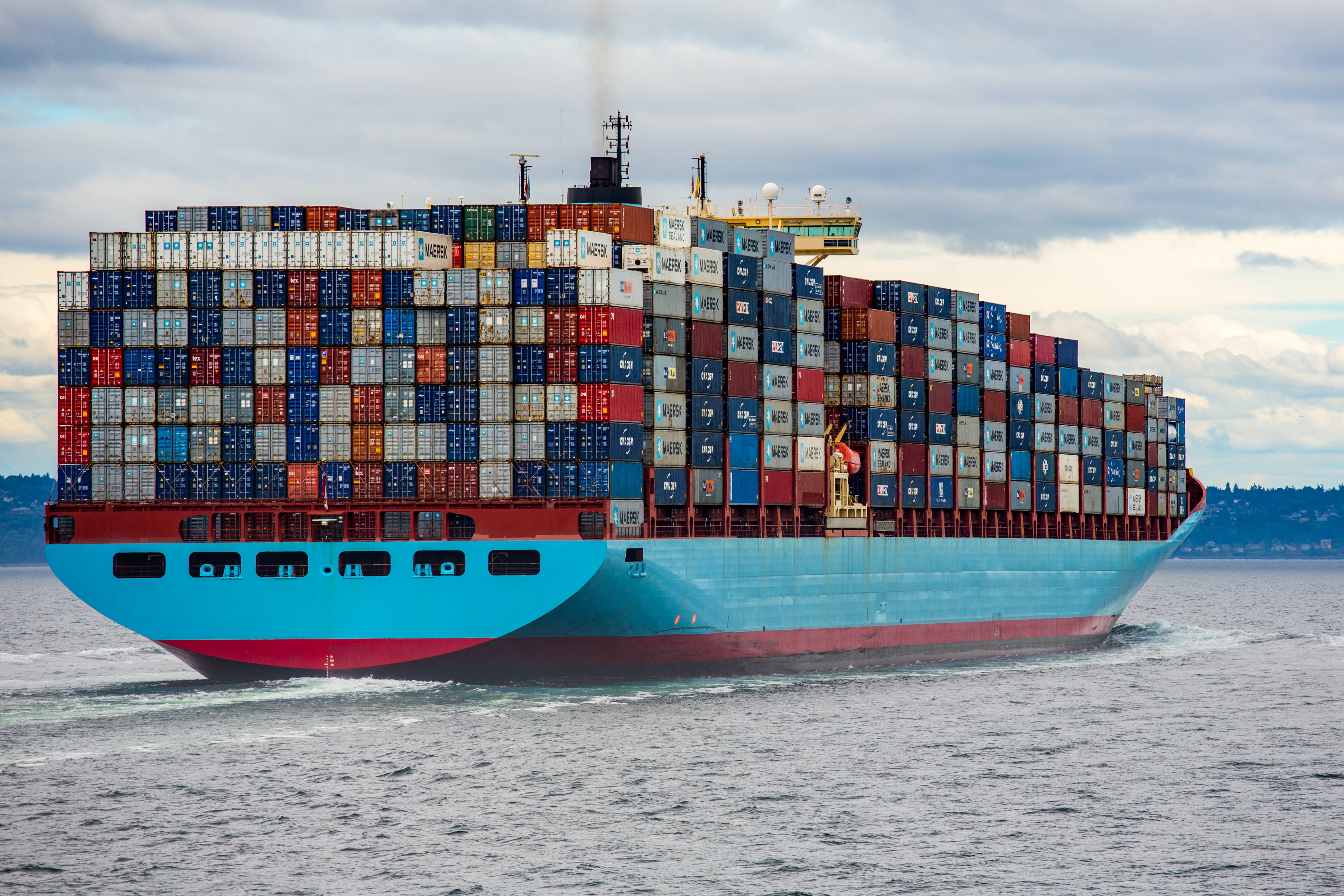Because of its intensive activity, the shipping industry is responsible to about 3 percent The global carbon dioxide emitter (about 1.1 gigatons), which accelerates climate change and is a major source of air pollution in the marine environment. All this happens mainly because most transport ships use fuel oil, which is a cheap, inferior and highly polluting type of petroleum distillate Now one of the largest shipping companies in the world - Mirsk is trying to find a solution

A little over a month ago, an unusual event took place off the Mediterranean coast of Israel. Over a thousand tons of tar covered most of the coastal strip and the pollution they created caused the death of many marine animals and severely damaged the marine ecosystem. The source of the pollution is, apparently, an oil tanker floating in the Mediterranean Sea from which large quantities of crude oil leaked which polluted the sea and the beaches.
Unfortunately, this is not a one-time event, but an ongoing danger, which does not end only with the release of oil into the sea.
The maritime transport industry constitutes one of the significant infrastructures of the global economy. In fact, as90 percent What we buy online comes by sea, an action that has become more frequent among many of us, especially during the Corona period. But because of its intense activity, the shipping industry is responsible to about 3 percent The global carbon dioxide emitter (about 1.1 gigatons), which accelerates climate change and is a major source of air pollution in the marine environment. All this happens mainly because most cargo ships use fuel oil, which is a cheap, inferior and highly polluting type of petroleum distillate.
Regulations against fuel oil
Last February, in coincidental but certainly symbolic proximity to the oil pollution that occurred in Israel, Maersk, one of the largest shipping companies in the world, announced that it plans to accelerate its plan to produce a carbon-neutral shipping container ship (Carbon Neutral), which will be launched by 2023 - this is out of a desire to reduce its environmental footprint and reach the goal of zero carbon dioxide emissions in its operations by 2050.
When talking about carbon neutrality, They actually mean the production processes of a product or service, at the end of which a balance is reached between the carbon dioxide emissions for which it is responsible and its absorption - so that in the end there is no increase in greenhouse gas emissions into the atmosphere.
"The shipping industry has quite a few negative effects on the environment. Starting with greenhouse gas emissions and poor air quality in port cities and, of course, oil and oil spills, as we recently saw on the Mediterranean coast in Israel," says Amir Salzberg, Director of the Transportation Division at the Ministry of Environmental Protection. "The use of fuel oil, as the main fuel to propel vessels, is extremely problematic from an environmental point of view. Fuel oil is the residue of oil after the higher quality distillates, such as cooking gas, gasoline and diesel, have been distilled from it. Basically, this is the waste left in the process and it includes heavy metals and polyaromatic compounds (toxic and carcinogenic organic compounds, n.n.) pollutants, which unfortunately have been used for decades."
About a year ago, regulations of the International Shipping Union (IMO) came into force, prohibiting the use of such polluting fuel. These regulations are expected to significantly change the use of fuel for shipping and thus open an opportunity to promote more environmental alternatives. "In light of the new regulations, there are international conventions that limit sulfur emissions and encourage the use of low-sulfur fuel oil. Another solution that exists is the installation and operation of receptors that remove the sulfur from the exhaust gases," says Dr. Nibi Kessler, senior coordinator for the field of water pollution from fuel at the Water Authority.

The customers pressed - the schedule was brought forward
Maersk It is one of the largest public shipping companies in the world. The company's annual revenues as of 2020 are approximately $39.9 billion and the company was ranked 622nd in the list of the largest public companies in the world by Forbes magazine.
The company operates a fleet of container and supply ships, its headquarters is in Copenhagen, Denmark and it operates in approximately 130 countries around the world, including Israel. The company is engaged in a variety of business areas, including the operation of container terminals in ports and activity in the oil and gas field. But its main business division is the transportation of containers and the operation of all related operations such as logistics services, shipping solutions and container terminals.
Initially, the company talked about launching a carbon-neutral container ship by 2030, but the target date was brought forward by seven years, due to pressure from its customers, including huge companies, such as BMW, H&M, Levis and Marks and Spencer, who have already announced that they want to reduce carbon emissions in their supply chain.
Maersk has accelerated the pace of development of its new ship (a relatively small cargo ship, which can carry about 2,000 containers), which will be powered by LEO , a biofuel she is developing, based on a mixture of lignin and ethanol. Lignin is a very common substance found in the cell wall of plants, and a significant part of the trunk bark of trees consists of it. The ethanol (C2H5OH) is an organic compound from the alcohol family (this is the alcohol found in spirits), and is used as an important component in fuel for racing cars, airplanes and high-powered engines.
Along with the new bio-fuel, it will also be possible to use fossil fuel (fuel oil) as a backup. According to Maersk, the plan is that in the near future such dual fuel systems will be installed in all the company's new ships.
Unlike fossil fuel, LEO There is a short carbon cycle, which according to Maersk should result in the carbon contained in the ethanol and lignin being removed from the atmosphere within a year of burning them as fuel. Thus, Maersk and other companies that will use LEO will be able to reduce their carbon emissions and even achieve full carbon neutrality.
"Our customers expect us to help them reduce their global supply chain, and we embrace the challenge and work on a solution and the practical, technical and safety challenges inherent in carbon neutral fuels, which we need in the future," he announced CEO of Maersk, Soren Sko. "Our ambition to have a carbon-neutral fleet by 2050 sounded illogical when we first announced it in 2018, but today we see it as a challenging goal, but nevertheless certainly achievable."
"Bio-methanol can be produced in an energy-intensive process from agricultural, plant and municipal waste. During the production process and the burning of methanol, carbon dioxide is also emitted into the air, but because it is emitted from a plant source, which assimilates carbon dioxide in the photosynthesis process, the overall process should be balanced in its carbon emissions," says Salzberg. "The thing with bio-methanol is that its production today is not energetically and economically efficient, even though it is a greener energy. Today, companies that decide to promote the use of bio-methanol lose money and energy during the process, but they understand and are willing to pay the price in order to be ready for the day when the regulator prohibits the continued use of fuel oil."
Not a perfect solution
Although Maersk's solution sounds like a successful solution to deal with the contribution of maritime transport to the climate crisis, in the 2019 report, IPCC – The Intergovernmental Panel on Climate Change Determined that the mass adoption of biofuels, such as the biofuel of the type that Maersk plans to use, is not the answer to the climate crisis. This is because it is a production process that requires the use of agricultural land for the growth of plants from which bioenergy (biofuel) can be produced. Something that could increase water shortages and threaten food security in some countries.
"Biofuels cannot be a scalable solution," said Paige Abbasov, director of the shipping program at the European climate lobby group. "These fuels can be produced in small quantities, but if we want to produce on a large scale, we will not be able to do so because the raw materials for production are limited."
If not LEO, the solution to the problem that maritime transport creates on the environment may come From the UK, There the government recently decided to invest 20 million pounds In developing innovations for more sustainable shipping methods, developing innovative ships with zero carbon emissions and greener and cleaner port infrastructures. Part of the new venture includes promoting collaborations between scientists and experts from the field of shipping, ports and shipyards, with the aim of finding new and economically and environmentally efficient ways to reduce the environmental footprint of maritime shipping.
- The European Space Agency photographed the traffic jam in the Gulf of Suez due to the stranded ship
- Summary of 2020 in the environment: not only Corona
- The lesson worth learning from 2020
- The oil slick that covered Israel's shores came from a ship carrying pirated oil from Iran to Syria
- A black flag over the coast of Israel
